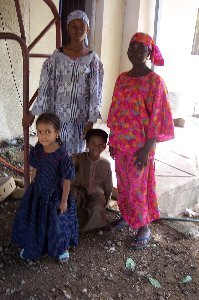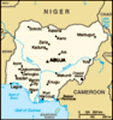Advertisement
Published: October 28th 2007

 Sonya's family
Sonya's family
Sonya's kids and servants.OK, so I know that some of you are deleting these emails by now, but for those of you that are still interested I'll give you one more piece on what I'm doing here before I get home.
Things are so different here in Nigeria that in east Africa. When I got off the plane things looked a lot like Kenya and Tanzania except for the very noticeable fact that I think I was one of two white people on the plane...the other person being a catholic nun. At least in east Africa they have tourists.
Also, everyone here wears traditional dress. The men wear long kaftans and pants with little Muslim hats like you might find in a lot of the rest of the Muslim world. To me, I keep thinking that it's so hot here and everyone is dressed to the gills in clothing. If I were in Texas, I’d be wearing shorts and a tank top, but that's just not possible here.
Nigeria is not really

 Abu and son
Abu and son
They were heading to the mosque.very much like east Africa at all, except that it's the third world and all that goes with that. It seems so much harder here to do anything and everything is done on the black market. Fuel is impossible to get and the electricity is out for sometimes two or three days at a time. Most of the wealthier families have generators that they run in the evening but "petrol" costs too much to run them all day long. Nothing runs on any kind of time schedule including airlines. When the plane is full, they go. Cashing a traveler's check is nearly impossible here as is using a credit card. Money is changed on the black market...even if you go to the bank. I got so desperate to change money that I changed a $100 traveler's check at way below the current value losing close to 20% of it's value. Fortunately, I had some dollars in cash as well and I changed that into nira. NEVER go to Africa with only traveler's checks.
When I first arrived, the entire country was on strike because the government was raising the tax on petrol to almost double the price of what the

 At the farm
At the farm
The lady got dressed up for this picture. Unfortunately, she wore less traditional clothes. She really was so sweet to us. cost was before. In this country where gasoline seems in more demand than the U.S. oil crisis in the 70's, this was an impossible demand. Nothing was working, and everything was closed. The strike ended peacefully, and banks and offices are opened again, but I'm not sure it made too much difference.
I’m not as impressed with Nigeria as I am with east Africa, but there have been a few very bright spots. My friend Sonya took me out to her husband's farm and we stopped by a Fulani village there. The Fulani people there work for Abu (Sonya's husband) and they were excited and honored to see us and also the children. They took us in their homes...conical grass huts with thatched roofs. The huts reminded me of an upscale version of a Masai hut. (Did I ever get around to telling you about the Masai and Samburu people?) It was an experience that I don't think pictures can describe properly. The woman wanted to take a picture with us, but once we started clicking pics, she said wait and left to get dressed up in less tribal clothing. I should have clicked faster. She brought us into her

 Fulani married lady's hut
Fulani married lady's hut
The bowls are a status symbol. The kids are Sonya's hut, which was full of bowls that she received as a bride. Apparently Fulani women display these around the room and the more the better. They're kind of a status symbol.
Also, we stopped at the home of the mother of our guide who is a friend of Abu. She ran around like a chicken with her head cut off trying to make us comfortable. She immediately got started cooking for us, which we had to politely thank her and decline due to time constraints. Everything is done from scratch here and without electricity. It would have taken waaay too long. So, since she couldn't give us food, she started passing out new underwear for the children and gave me a couple of woven fans made out of grass. I think seeing the village people here is far better than any animals or scenery. They are so wonderful and unique and they will go out of their way to do anything for their guests.
A couple of days ago in Kano, we went to the dye pits where they dye cloth a certain type of indigo. It's in somewhat of a state of disrepair (as is the rest of Nigeria),

 Fulani farm village
Fulani farm village
They are like upscale Masai huts.but many of the pits are still in use. These dye pits have been in constant use for the past 600 years so they were especially interesting to me. The guy showed us the pits took us down some road of the old city to buy some dyed clothing and I felt like I was in another world. The streets are too small to have any kind of motorized vehicles so the atmosphere was somewhat more ancient than anything I've seen in Africa so far. It reminded me of an older, filthy version of the streets of Jerusalem.
Sonya's home is a sight in itself. She lives in a huge compound owned by her father-in-law. There are probably 50 people who live here in the houses within the compound and everyone is related and/or works here. Amazing. Chickens goats and turkeys run free next to the two horses and tennis court.
I think Sonya has been very gracious to make every effort to show me around all the sights even with all the difficulties here and the strike. It's not easy to show me around and take care of four kids, but she manages and I'm grateful.
There's so much
more I could tell you, but my time is low that I had better go ahead and send this.
If you are interested in hearing about he Masai and Samburu people in Kenya, let me know and I'll tell you about that as well.
Advertisement
Tot: 0.124s; Tpl: 0.011s; cc: 9; qc: 51; dbt: 0.0787s; 1; m:domysql w:travelblog (10.17.0.13); sld: 1;
; mem: 1.2mb


















